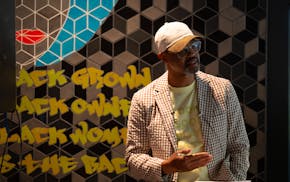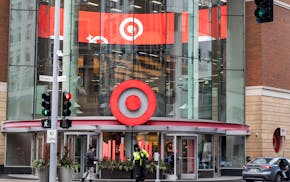Novelist Steve Almond, in his 2004 nonfiction book "Candyfreak," about his obsession with candy, mused about how small his life as a college writing instructor in Boston was compared to that of a "chocolate engineer" he met in New Hampshire.
That's how I felt when I visited Abdallah Candies in Apple Valley and company president Steve Hegedus stepped into the tiny visitor lobby to greet me wearing a hair net and smock.
He'd come from the production kitchen, where Abdallah employees were cranking out another wave of specialties for Easter, one of the biggest holidays of the year for candy consumption. The whole building smelled of chocolate, and I thought: There is no better place to work in Minnesota, maybe the world.
"When you grow up in a family business, as soon as you can see over the table, you're learning," said Hegedus, a fourth-generation descendant of founder Albert Abdallah. "I learned with my grandfather and my uncle and dad how to make the marshmallows and nougat. I did dishes after school in high school, that whole thing."
These days, Hegedus and his wife, Karen, lead the company, and their three sons and a nephew form a fifth generation that may take control in the future.
"I don't know if it's like this for other businesses, but it's more of just a vocation," Hegedus said. "It's a business, yeah. But we just want to make good candy and we want people to come back for that candy again. That's all that all matters."
His matter-of-factness reminded me of another passage in Almond's book about that chocolate engineer, named Dave. "It was now clear I was in the presence of freak genius," Almond wrote. "But Dave's approach to chocolate was actually pretty low-key."
For the last three years, poor harvests of cocoa beans in Africa have dominated the economics of candy-making. Cocoa prices have soared to around $8,000 a ton, from $3,000 two years ago, which has led manufacturers to raise prices for finished goods. Chocolate consumption in the U.S. fell last year.
At Abdallah, cocoa purchasing is done on a yearly basis. The firm is too small to monitor the daily changes in cocoa prices or to build hedges against big swings in price.
"I think we do a really good job to cover ourselves for the size business we are," Hegedus said. "But we get stung sometimes. The ones who are smaller get stung harder. It's hard to compete with the bigger companies that are being protected [with their purchasing strategies] but that's the name of the game."
Abdallah has raised its prices to customers, though not as much as its costs have gone up.
"We made a business decision to make a little less profit, knowing that the cycle evens out," Hegedus said. "Could we keep it up much longer? No. Is the market easing a little bit? Yes. I do stress a little bit. The main cocoa crop is in the fall and we would hope to see some price drops."
He cautioned me that cocoa represents only about 50% of the company's input costs. Nuts, sugar and packaging have also increased.
Some candy-makers will tweak their output, producing more nut-heavy products when cocoa prices rise. Hegedus said Abdallah simply produces what their sales figures show consumers like.
"We have actually swung toward more chocolate-inclusive products, and it wasn't really due to the decision of the market," he said. "It was due to decisions we made post-COVID to buy equipment to do pieces like solid chocolate bars, peanut butter cups and truffles that had high percentages of chocolate."
That equipment arrived in 2023, just when cocoa prices began their climb. "It took a long time to get in," Hegedus said. "We're sitting with good infrastructure to make solid chocolate pieces, yet with a high market, what are we to do? We're going with the plan."
Abdallah employs about 140 people in production on the first shift, and around 20 on the second shift, who manage to produce 200 different products. Hegedus said he can count the number of people in the corporate office on two hands.
Like many food manufacturers, Abdallah also does contract production, chiefly private label and store brands, in addition to its own branded goods. Distribution is even more complex than production. While Abdallah's products are in most of Minnesota's grocery chains, the firm's primary customers are thousands of small gift shops around the country.
"It's very labor-intensive," Hegedus said. "Instead of pulling pallets together or truckloads together, we pull five of these, two of these, three of these, for each customer order and ship in boxes that are going on a UPS truck or FedEx plane."
That gives the whole business the feel of a small candy store. "The quality we like to have is make it in the back, sell it in the front," Hegedus said.
"Each generation did a little bit more of what the other generation did," he said of his family of candy-makers. "There was no magic model. Each had to have the room and the wherewithal and a little bit of stomach to put up with some risk and do something. That's really all I did, just made some room and relied on a lot of good people around me."

Ramstad: Minneapolis' Camden neighborhood is rising. Houston White wants to keep it that way.

Ramstad: Minnesota's big businesses are in crisis with a common problem

Ramstad: No business can 'eat' all the tariffs, not even Walmart

Ramstad: Donaldson is protected from tariff chaos after expanding globally the right way


